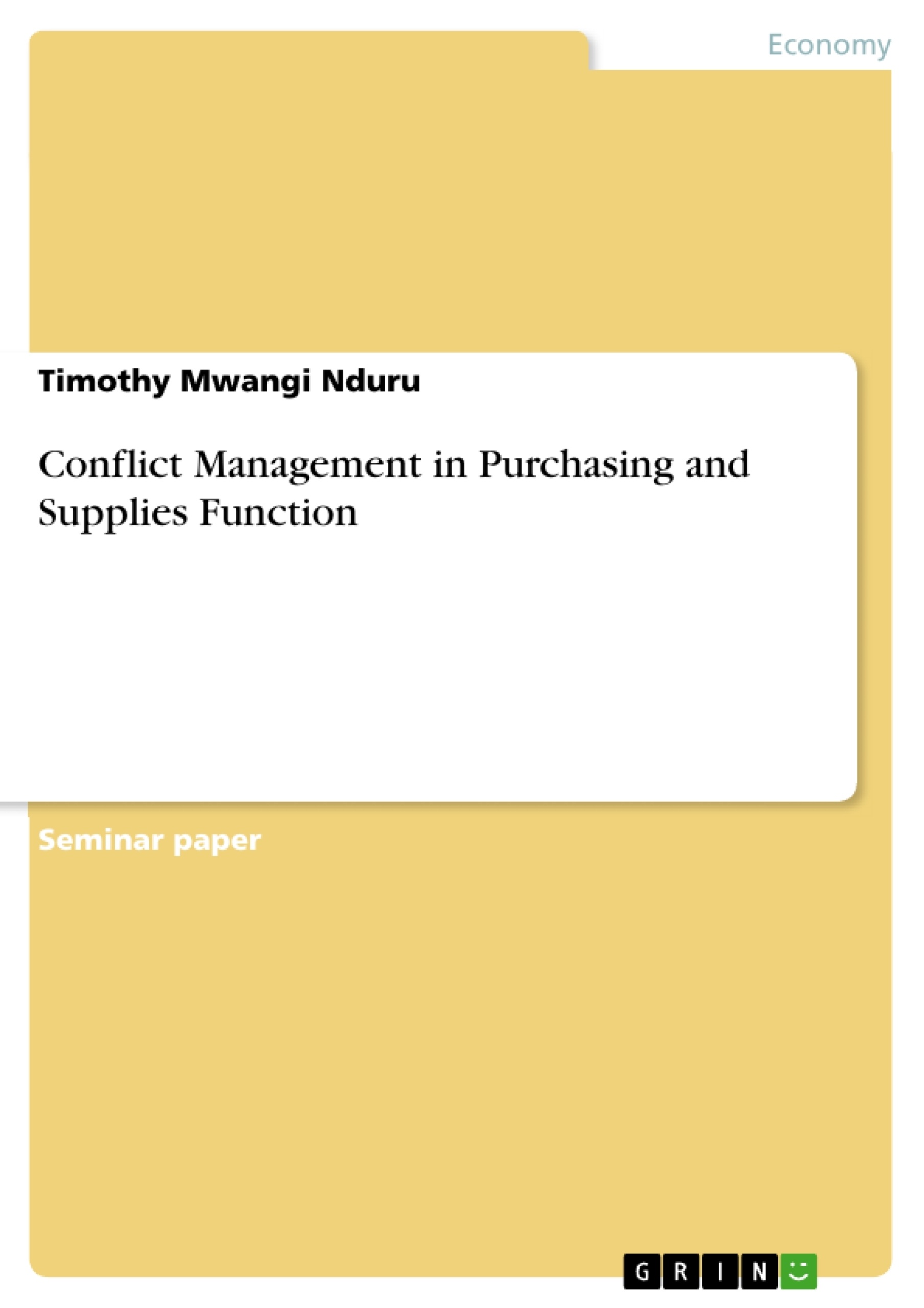Conflict is an inevitable part of the human interaction that occurs at all levels in the society such as interpersonal, intragroup, international and international. However, it is clear that conflict can be healthy or unhealthy for the parties involved. Notably, it is a common phenomenon experienced in every society on a day to day basis, therefore, it is important for the relevant parties to address it at an early stage. The purchasing and supplies functions involve a lot of human interaction thus making conflict among the involved parties inevitable. Purchasing and supplies functions often experience conflict which has to be addressed to ensure the function/department is able to perform its function effectively. This paper focuses on conflict management in purchasing and supplies function within organizations.
Inhaltsverzeichnis (Table of Contents)
- Conflict Management in Purchasing and Supplies Function.
- INTRODUCTION
- FUNCTIONAL AND DYSFUNCTIONAL CONFLICT
- LEVELS OF CONFLICT
- Intrapersonal Conflict
- Interpersonal Conflict
- Intragroup Conflict
- Inter-Group Conflict
- Intra-Organizational Conflict
- CAUSES OF CONFLICT
- APPROACHES/MODELS TO CONFLICT RESOLUTION
- The Thomas Kilmann Model
- The Win-Win Approach
- FORMAL MECHANISM OF CONFLICT RESOLUTION
- Disciplinary Procedures
- Alternative Dispute Resolution Mechanism (ADR)
- SIGNS OF CONFLICT
- ADVANTAGES OF CONFLICT MANAGEMENT
- CONCLUSION
Zielsetzung und Themenschwerpunkte (Objectives and Key Themes)
This paper explores the nature of conflict management within the purchasing and supplies function of organizations. It examines the various levels of conflict that can arise, from intrapersonal to intra-organizational, and investigates the causes and potential consequences of conflict.
- Understanding the different types of conflict within purchasing and supplies functions.
- Analyzing the causes of conflict in this context.
- Exploring the potential benefits and drawbacks of conflict.
- Identifying strategies for effective conflict management.
- Discussing formal mechanisms for resolving conflicts.
Zusammenfassung der Kapitel (Chapter Summaries)
- Introduction: This chapter introduces the concept of conflict as an inevitable aspect of human interaction, particularly within organizational settings. It highlights the importance of addressing conflict effectively in the purchasing and supplies function to ensure efficient operations.
- Functional and Dysfunctional Conflict: This chapter differentiates between functional and dysfunctional conflict, outlining the positive and negative effects each can have on organizational performance. It emphasizes the importance of understanding these distinctions for effective conflict management.
- Levels of Conflict: This chapter provides a detailed overview of the various levels of conflict, ranging from intrapersonal conflict within individuals to intra-organizational conflict between different departments. It explores the dynamics and causes of each level.
- Causes of Conflict: This chapter examines several key factors that contribute to conflict within purchasing and supplies functions. These include ambiguous jurisdictions, authority imbalances, differences in group perceptions and goals, and personality clashes.
- Approaches/Models to Conflict Resolution: This chapter introduces different approaches and models for resolving conflicts, focusing on the Thomas Kilmann Model and the Win-Win approach. It discusses the strengths and limitations of each approach.
- Formal Mechanism of Conflict Resolution: This chapter explores formal mechanisms for resolving conflicts, including disciplinary procedures and alternative dispute resolution mechanisms (ADR). It examines the purpose and applicability of these mechanisms in various organizational settings.
Schlüsselwörter (Keywords)
This paper explores key concepts related to conflict management in purchasing and supplies functions, including: conflict types, conflict causes, conflict resolution approaches, disciplinary procedures, alternative dispute resolution mechanisms, and the importance of effective communication and collaboration.
- Quote paper
- Timothy Mwangi Nduru (Author), 2019, Conflict Management in Purchasing and Supplies Function, Munich, GRIN Verlag, https://www.grin.com/document/463250



